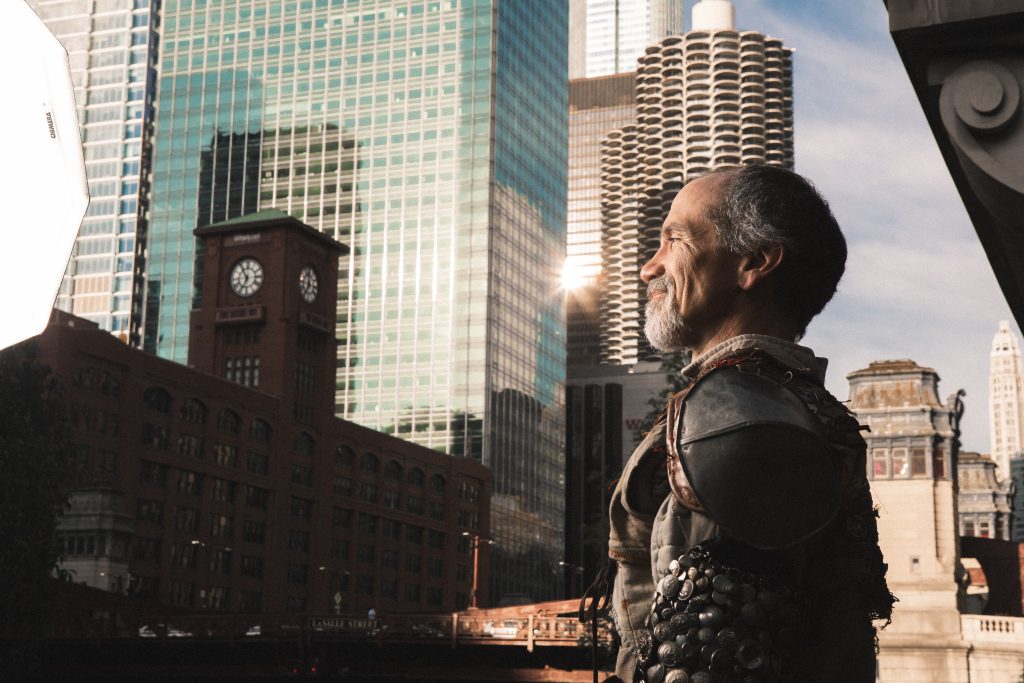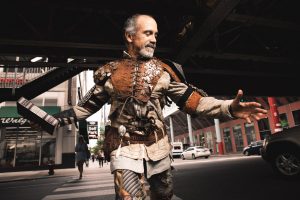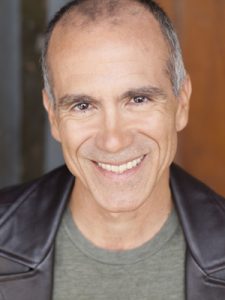Henry Godinez was born in Cuba, one of ten children in an upper middle-class family. Afraid that their children would be conscripted into Castro’s military, Godinez’s parents moved the family to the United States when he was three, eventually settling in Dallas.
A high school drama class piqued the young man’s interest in the stage, and he went on to study theatre first as an undergrad at the University of Dallas before moving on to the graduate program at the University of Wisconsin-Milwaukee. All the while, Godinez wondered about the direction he was taking. “I always thought there would be something else that seemed to click more in terms of doing something,” he admits. “Maybe that comes from being a Cuban refugee or something. But I always kept doing theatre.”
After grad school, a classmate of Godinez’s, who already had an agent in Chicago, invited him down to audition for a film role. More auditions came and soon he was cast in a production of Kabuki Medea at Wisdom Bridge Theatre in 1983. Godinez remembers, “I kept working and thinking ‘next year, I’ll move to New York or LA.’ And then we started Teatro Vista.”
While performing in a play at Goodman Theatre, Godinez and two other Latino actors, Ramiro Carrillo and Edward Torres, would talk about all the great plays by Latino playwrights that no theatres were producing. “So we just said, ‘What if we did them?’” Godinez explains. Thus, Teatro Vista, Theatre with a View,born in 1990 with an inaugural production
at a Pilsen arts center that is now the National Museum of Mexican Art. Godinez led the company as Artistic Director for its first five years. “We wanted to attract both Latino and non-Latino audiences,” says Godinez. “We wanted to cross over and bridge the gap between the Latino community and the non-Latino community. We felt we should be in the community but also part of the mainstream. We should be in conversation with the big theatres. Our work should be in those theatres instead of being marginalized. That’s who we are as Americans.”

Pictured: Henry Godinez. Photo by Joe Mazza—Brave Lux.
For me, anyway, it isn’t just to get rich or just survive. It seems like there is something we’re supposed to do, and QUIXOTE really speaks to that for me.
Goodman Theatre invited Godinez to join their Artistic Collective in 1997, after he was directed the 1996 edition of the theatre’s annual A Christmas Carol production and a 1995 co-production with Teatro Vista of Cloud Tectonics by Jose Rivera. Godinez would helm Goodman’s annual holiday production six times, including the final Christmas in the old Goodman Theatre in 1999 and the first two Christmases in the new theatre on Dearborn. Another personal highlight for Godinez was directing a revival of Luis Valdez’s Zoot Suit in 2000 at Goodman. “Valdez, who I consider the godfather of Latin American theatre, worked with me closely on that production,” Godinez remembers fondly. “It’s such an iconic play. I was super proud of it. And, it was the largest Latino audience ever in the history of the Goodman [at the time].” Godinez has also been teaching theatre for years now, first at Columbia College, then at DePaul University and now at Northwestern University.
Coincidentally, the first Broadway show that Godinez ever saw was a 1977 revival of Man of La Mancha, also based on Cervantes’ Don Quixote. “It blew me away and affected me deeply,” he affirms. “I think he just really meshed with some part of me that thinks there has to be some reason we are here on the planet. For me, anyway, it isn’t just to get rich or just survive. It seems like there is something we’re supposed to do, and Quixote really speaks to that for me. I never thought I’d be playing him.”

Pictured: Henry Godinez. Photo by Joe Mazza—Brave Lux.
The journey towards playing Quixote at Writers Theatre began in 2003, when Godinez organized Goodman Theatre’s first annual Latino Theatre Festival. Inspired by what he had seen at the International Hispanic Theatre Festival in Miami, he paired two international productions with some pieces by Chicago-based Latino artists. One of the two international productions, which had been recommended to him by the Miami festival, was The Grey Automobile by a theatre company from Mexico City called Teatro de Ciertos Habitantes, led by Claudio Valdés Kuri. “I was blown away by the work,” Godinez says, “and fell in love with [Claudio] as a human being.”
Godinez and Valdés Kuri kept up over the years. At a Theatre Communications Group event in 2014, Godinez introduced WT Artistic Director Michael Halberstam to Valdés Kuri, hoping to eventually have him direct at a Chicago theatre. In 2016, Godinez went down to Mexico City to see the newest work by Teatro de Ciertos Habitantes, Quixote: vencedor de si mismo. “I thought it was amazing,” he remembers. “It’s just an actor, words and movement.” Both Godinez and Valdés Kuri thought this was the perfect piece to bring to Chicago. “[Claudio] said, ‘it seems like this would be a great play for Michael’s theatre. Tell him that we will get it translated into English and you can be Quixote.’ Everything was good until that point. Because I don’t really pursue acting any more. It had been a long time,” jokes Godinez. “I was pleasantly surprised that Michael jumped on [the idea]. I had been hounding Michael to do some Latino programming. Starting with Cervantes isn’t all that bad!”

Pictured: Henry Godinez. Photo by Joe Mazza—Brave Lux.
To get ready for the production, Valdés Kuri has his Quixote taking acrobatics classes at the Actors Gymnasium in Evanston, as well as some tap dancing lessons. Through all of the various moments of his daily life, Godinez is finding himself thinking about the knight-errant and what the world of 2017 can learn from him. “I think part of it, without getting too political, is that we live in a time where it is so easy to be disillusioned, jaded, and disengaged from the world and also from something greater than ourselves—a common good that is greater than us,” explains Godinez. “For me, Quixote is that standard bearer.
He is that benchmark for what a human being can strive for. Yes, it is idealistic. Yes, it is excessive. I lament that in our world today, it seems ridiculous that you should strive to do good no matter what. Even if people call you crazy, even if it doesn’t make sense, even if you get beat up, even if it’s impossible. That’s what life’s all about for him. We live in a world that is so materialistic and jaded that we can’t see the forest for the trees. We can’t see the greater good for the day to day challenges of just surviving, existing, advancing, progressing. None of that mattered to Quixote.”



No comments yet.